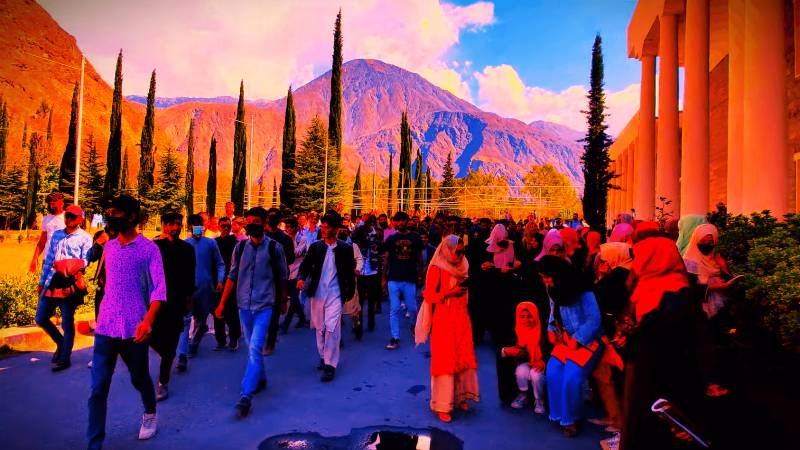
The scenic landscape of Gilgit-Baltistan has, in recent weeks, witnessed a disturbance in its stoic calm after students of the region's only university, the Karakoram International University (KIU), protested over an inordinate hike in fees.
As the student body and varsity continue deliberations, it is critical to review the root cause of the problem, which, to outsiders, is often lost in the region's natural beauty.
Let me start by dispelling some widely-held misconceptions about Gilgit-Baltistan, key among them that the population has a literacy rate of over 90%. This statistic is as distant from reality as democracy appears to be in the greater national context.
In fact, this misinformation conceals the struggles of a region that has long been grappling with woefully inadequate and underfunded educational facilities. Its cries about disparities fail to reach mainlanders, who tend to exoticize the region.
The ignorance has made the situation on the ground more dire in recent days. The recent disproportionate fee hike by the KIU administration and the resultant street protests by students caused the protracted closure of the institution, only one of its manifestations.
The region's acute lack of educational facilities compels students to move to cities in other parts of the country after completing higher secondary education to pursue higher studies
To give you an idea of the deprivation of the region, consider that the region's only public-sector university was founded as recently as 2002. It bears the burden of accommodating students seeking a higher education from a region that has a population of 2.5 million. At the moment, its student population is around 10,000.
The sole higher education institution in the region is woefully underfunded and grossly lacks resources. As a result, it offers subjects across four basic faculties, including Social Sciences, Arts and Humanities, Natural Sciences and Technology, and Life Sciences. The absence of any medical or engineering institution in the region compounds the situation for students.
The region's acute lack of educational facilities compels students to move to cities in other parts of the country after completing higher secondary education to pursue higher studies. That, of course, comes at a huge financial cost, apart from the mental anguish of staying away from one's home and family for a long.
The issue at hand, however, has put the future of thousands of students at stake. Students from KIU's main campus launched a days-long sit-in, blocking the road leading into the varsity. They were protesting an exorbitant fee hike of 135% since 2020. They argued that the hike blatantly violated the Higher Education Commission's (HEC's) policy, which sanctions only a 10% annual increase.
The All-Students Alliance, a representative body of students, expressed their concerns regarding the financial crisis and administrative mismanagement that has jeopardized the future students. Beyond the demand for a rollback of the fee hike, the protesters called for a thorough financial audit of the varsity and establishing an anti-harassment cell.
Where the institution really struggles is in attracting a talented faculty. Its meagre incentives offer no draw to accomplished PhD teachers, which only exacerbates the situation, casting a shadow over the quality of education offered
They also voiced their concerns over stifled freedom of speech, recalling how 11 of their fellow students had been suspended and subsequently expelled for advocating for students’ rights. They also urged the varsity's administration to reinstate student unions for a more enlightened and democratised educational milieu on campuses.
An initial weeks-long protest in October this year dispersed after the government promised to release Rs300 million for the university as a grant. But the reality was far different, with the government only releasing Rs50 million thus far.
While the university has cautiously resumed activities after a brief closure, there has apparently been no progress on reducing the fees.
The issue at hand extends far beyond the immediacy of the fee hike and lays bare some of the grave issues which often shroud themselves in silence. The underlying issue is a dearth of funds, which births many challenges such as inadequate classrooms, sparse furniture, the lack of proper outdoor sitting areas, transportation, modern labs, and the absence of modern, technology-driven resources.
Where the institution really struggles is in attracting a talented faculty. Its meagre incentives offer no draw to accomplished PhD teachers, which only exacerbates the situation, casting a shadow over the quality of education offered and, consequently, producing mediocrity. This impacts the region's future in a profound manner, which is foreboding a gloomy and shallow educational trajectory.
There is something to be said about the challenge of pursuing an education or employment outside of Gilgit-Baltistan. Students studying or working in cities across the country often undertake a singular annual trip home. Usually, winter vacations granted by universities span hardly a month and coincide with clement weather back home, which makes the journey home and back perilous along the seventh wonder of the world, the Karakoram Highway (KKH). So, the only viable option remains limited to an annual visit. Yes, you heard it right, one trip home once a year.
If you happen to skip the annual visit, your next turn will perhaps come in the same period the following year. By the time you get to visit, you may have missed the birth of a new member of your family, and they probably would have progressed into early childhood, capable of speech and interaction. The situation is a little worse for those working as the corporate sector is often too stingy when it comes to granting leaves – a month after a year's work.
In a milieu where constitutional depravity amongst the educated youth is already seething, such circumstances further add to the frustration of the youth and an educationally disadvantaged generation that could potentially become more dissentious and rebellious towards the corridors of power in the years to come. Therefore, the urgency of addressing these disparities becomes not just a matter of education but a crucial element in shaping the destiny and aspirations of a neglected populace.

